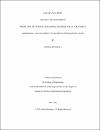Prediction of Optimal Hexagonal Interior Angle for Energy Absorption: Ann to Predict In-Between Experimental Data
| Advisor | Mahdi, Elsadig |
| Author | Bennbaia, Shada |
| Available date | 2021-08-22T09:53:01Z |
| Publication Date | 2021-06 |
| Abstract | This thesis's proposed strategic procedure is to predict the interior angle of a hexagonal passive energy absorber structure based on specific properties using an ANN model, which has a great potential to be used as an intelligent engineering design tool. The application of passive energy absorption structures are continuously growing in automobiles, aerospace, packaging industries, and many more due to their high energy absorbing capabilities. This study investigated the energy absorption performance of the aluminum hexagonal structure under quasi-static axial compression tests. These hexagonal structures are designed to have varying interior angle values to study their crushing behavior and identify the relationship between the energy absorption capability and the angle. Artificial Neural Network (ANN) model has been developed, optimized, and evaluated based on the Mean Squared Error (MSE) as a loss function to evaluate the performance of the model. During training, the configured ANN model had a training loss of only 0.09. The model predicted the hexagonal ring angle from unseen data with accuracy between 98.24% and 99.85%. Moreover, the predictive model was used to predict an optimal angle for targeted energy absorption properties based on two different cases. The first case was to maximize the energy absorption and the crushing stability, while the second case was to maximize the load-carrying capacity and amount of energy absorption. |
| Language | en |
| Subject | ANN Artificial Neural Network (ANN) Mean Squared Error (MSE) |
| Type | Master Thesis |
| Department | Mechanical Engineering |
Files in this item
This item appears in the following Collection(s)
-
Mechanical Engineering [67 items ]


